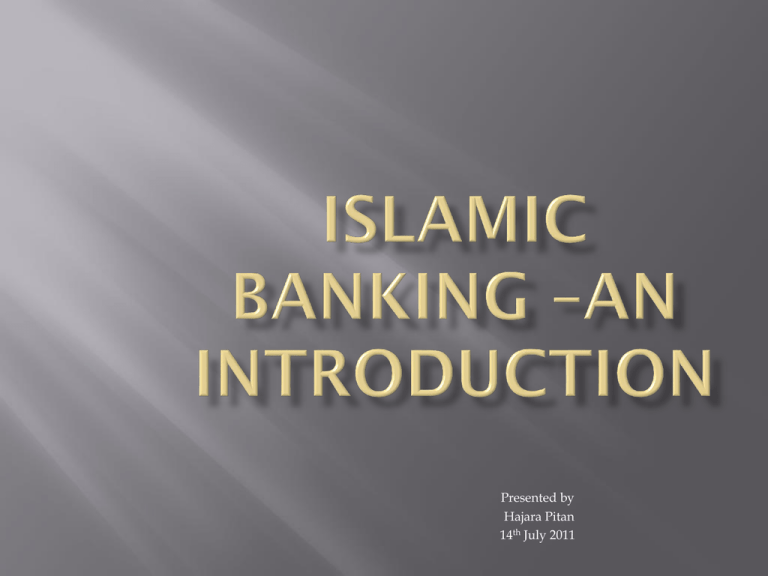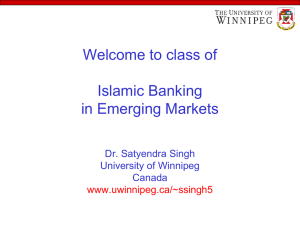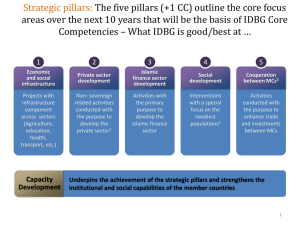- Babalakin & Co.
advertisement

Presented by Hajara Pitan 14th July 2011 Islamic banking is a system of banking or banking activity that is consistent with the principles of Islamic law. Islamic law prohibits the charge of interest on loans (usury called RIBA in Arabic) . Considerations: - Islamic States were governed such that the political head was also the religious head. - It therefore meant that the well being of members of the community rested with him. - Thus Islamic banks were to act as financial intermediaries and investment institutions. Similar services to those of conventional banks Offer chequeing accounts and clearing mechanisms, bank drafts, bills of exchange, travelers’ cheques. Also offer various types of customer accounts Justice, equality and solidarity Forbidden List (Haram) Property Rights are key Fair distribution of wealth Effort and risk sharing precede gain Key Points Forbidden Products & Services Uncertainty of outcome Banking Procedure Charge of Interest Speculation Discouraged Prohibition of predetermined payment above principal lent Lender participates in profits or losses of business or use to which money lent was used. Making money from money- haram Prohibition of uncertainty, risk or speculation (Gharar in Arabic) No investment in services or products that are not forbidden or even discouraged by Islam. BASIC FRAMEWORK: PROHIBITION OF RIBA • Islamic scholars differ on what would amount to Riba or interest •Prohibition of ALL forms of Riba •Interest based transactions pass unjust risks to borrower • OBJECTIVES OF ISLAMIC BANKS: •Execution of financial dealings in accordance with principles of Shariah •To support Muslim communities in utilizing and properly allocating financial resources. •To provide an option of financing for Muslims who want to get same in compliance with Shariah Prohibition of Interest Consumer Lending discouraged Profit and Loss Shared Investment in Real Estate encouraged Current Accounts Investment Account Savings Account Available Deposits Investment Financing Trade Financing Lending Other Financial Services MODES OF FINANCING Investment financing musharaka (joint venture) mudarabha (passive partnership) Mark up leasing trade financing lending Trade financing loans with a service charge Hire purchase no cost loan Sell and buy back other financial facilities Over drafts Letters of credit THE STRUCTURE OF A MUDARABA CONTRACT Transfer of title to customer Transfer of title to bank ISLAMIC BANK VENDOR Payment of purchase price (P) CUSTOMER Payment of marked up price (P + X) 14 Bank Buys the asset from the Vendor The customer buys the asset from the bank at a markup price Mark up price + X is payable at agreed interval. Time between purchase from the bank and agreed interval is period of financing. The title moves to customer on purchase from the bank but stays in bank’s custody as collateral until agreed payment is made. THE STRUCTURE OF A MUSHARAKA CONTRACT ISLAMIC BANK PARTNER (Customer) 60% Ownership 40% Ownership MUSHARAKA 16 PART II Section 33 (1) (b) Central Bank of Nigeria Act (CBN) Act 2007 Sections 23 (1), 52, 55 (2), 59 (1) (a) and 61 of the Banks and Other Financial Institutions Act 1991 (as amended) provides for: Commercial banks Merchant banks Specialised banks Non-interest banks Microfinance banks Development banks Mortgage banks Guidelines for the Regulation and Supervision of Non-Interest Financial Institutions released 13th January 2011 Amended 21st June 2011 Thrust of the amendment is that non-interest banking is not limited to Islamic Banking. divided into the provision of financial products and services based on: 1. principles of Islamic Commercial jurisprudence 2. any other established rules and principles The CBN in order to exercise its oversight functions is to have in place an advisory council of experts. The advisory Council of experts to charged with the responsibility of: ensuring that the financial products offered by the Islamic Banks meet the minimum requirements of Islamic Commercial jurisprudence. Advising the CBN on the appropriateness of the relevant financial products to be offered by such institutions. PROHIBITION OF DISCRIMINATION: on any grounds in the participation of any institution or person as promoters, depositors, or other party. ? The CBN is to issue further directives on corporate governance, product compliance, risk management, capital adequacy and operations, based on principles of Islamic Commercial jurisprudence. CBN COMMERCIA L BANKS SPECIALIS ED BANKS NONINTEREST FINANCIAL INSTITUTION S ISLAMIC FINANCIA L INSTITUTI ONS OTHER NIFIs MERCHAN T BANKS MICROFINAN CE BANKS, DEV. BANKS, MORT. INSTITUTION S Non-permissible transactions for IIFS are transactions relating to: Gambling Speculation Unjust enrichment Exploitation/unfair trade practices Dealings in pork, alcohol, arms & ammunition, pornography Products, goods or services which are not compliant with the rules of Islamic commercial jurisprudence; and Transactions which are uncertain or ambiguous relating to the subject matter, terms and conditions Institutions Offering Islamic Financial Services are not to have the word “Islamic” in their names except with the consent of the Governor of the CBN. They shall be referred to IIFS on all signage, adverts and promotional materials to facilitate recognition by the general public. IIFS may be: 1. full fledged Islamic banks or full fledged Islamic banking subsidiary of a conventional bank Full-fledged Islamic merchant or full fledged Islamic Banking subsidiary of a conventional merchant bank A development bank offering Islamic Financial Services A primary mortgage institution licensed by the CBN to offer Islamic Financial Services… Technical Agreement executed by the promoters of the proposed institution with an established and reputable Islamic Bank or financial institution. Technical Agreement must specify the role of the parties must be for a minimum period of 3 years from the date of commencement of operations. Terms of license may allow regional or national operation Regional: must have a presence in at least 6 and maximum of 12 contiguous states of the Federation lying within not more than 2 geo-political zones National: all the states of the Federation including the Federal Capital Territory Capital Adequacy Ratio (CAR): All IIFS shall maintain a minimum capital adequacy ratio as may be prescribed by the CBN The minimum capital adequacy ratio shall be consistent with the minimum CAR for conventional banks Liquidity Management: they must have appropriate policies, strategies and procedures which ensure that they maintain adequate liquidity to fund their operations at all times They shall not invest their funds in interest bearing securities or activities IIFS are expected to comply with other prudential requirements on exposure and concentration limits as may be prescribed by the CBN They are also to comply with standards of best practices issued by the CBN All IIFS are required to screen shareholders, customers, counterparties, transactions, products and activities against the proceeds of crime, corruption and terrorist financing, using legal and moral filters. They must all have effective AML/CFT policies and procedures and comply with relevant guidelines and statutes for combating money laundering and terrorist financing. The controversy rages on Islamic banking has been said to aid the development of poor economies The Nigerian framework under which Islamic banks are to operate is still unfolding Babalakin & Co. is uniquely positioned to capture the niche market which this new regime offers








